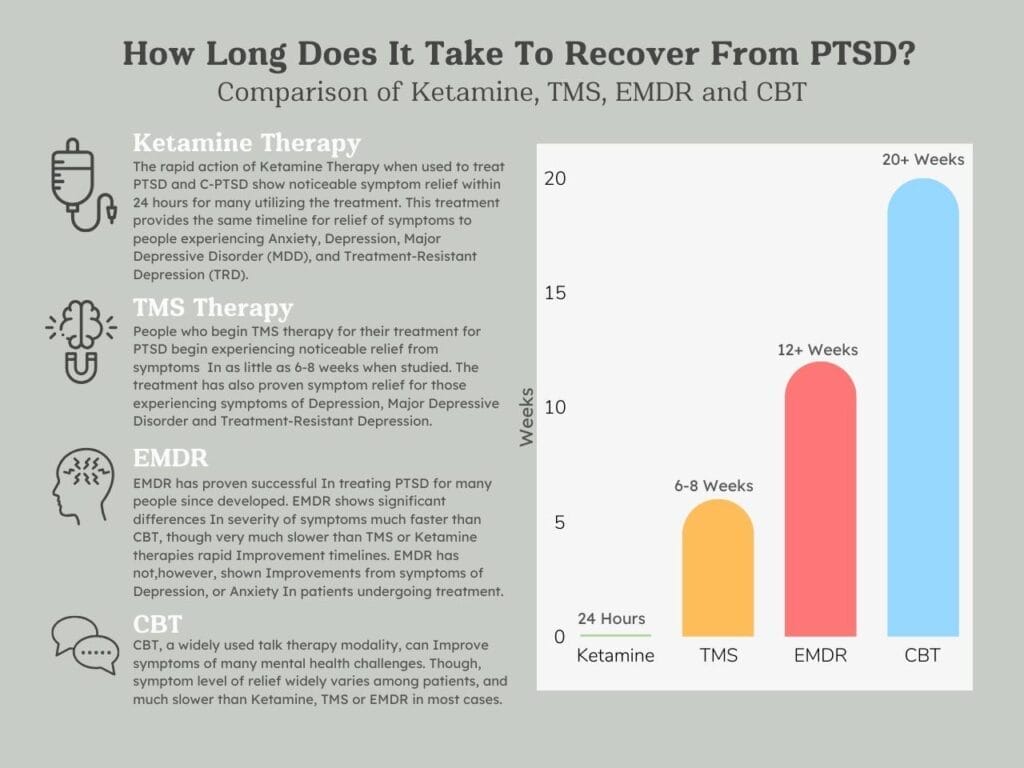
Conscious Health specializes in the intricate treatment of Post-Traumatic Stress Disorder (PTSD) and its more complex variant, Complex PTSD (C-PTSD). Our mission is to offer enlightenment and guidance on these conditions at our PTSD treatment center in Los Angeles, California. We want to empower you to make informed decisions for your mental health journey. Through innovative and compassionate care, we’re here to help you navigate the path to healing and reclaim your life from the shadows of trauma.
PTSD is a condition that may arise after exposure to a traumatic event, manifesting in symptoms like flashbacks, nightmares, and severe anxiety that disrupt daily life. It’s a response that can vary significantly from person to person, underscoring the importance of personalized care.
Confronting an invisible enemy like PTSD or C-PTSD can feel like a solitary fight, but you don’t have to go about it alone. Conscious Health is ready to be an ally, offering advanced therapeutic strategies that go beyond conventional methods to conquer PTSD, striking at the core of the symptoms and enhancing your strength to learn, grow, move forward to secure yourself and the ones you love.
Emerging from prolonged traumatic circumstances, C-PTSD encompasses the symptoms of PTSD along with additional struggles such as emotional dysregulation and difficulties in forming healthy relationships, reflecting the deep-seated impact of extended exposure to trauma.
Trauma impacts individuals differently, leading to conditions like PTSD and C-PTSD that significantly affect daily life. Without proper understanding and differentiation between PTSD and C-PTSD, treatments may not fully address the specific needs of the individual. The lack of targeted treatment can prolong suffering and hinder the healing process.
Conscious Health is a Complex PTSD treatment center aimed at lifelong relief. Contact us now for an assessment that understands and differentiates your needs, paving the way for effective growth.







While PTSD and C-PTSD are rooted in traumatic experiences, their manifestations diverge significantly, reflecting the nature and duration of the trauma endured.
Understanding the nuances between PTSD and C-PTSD is crucial for effective treatment, acknowledging the depth of trauma’s impact on one’s life.
PTSD arises from single or short-lived traumatic events, while C-PTSD stems from chronic, repeated trauma. Confusing these conditions can lead to inadequate treatment plans. Incorrect treatment could exacerbate symptoms, affecting life quality and recovery progress.
Clarify your path to recovery. Schedule an appointment with us to accurately identify your condition and begin the most effective treatment tailored to you.
At Conscious Health & Wellness Center in Los Angeles, our commitment extends to providing effective, evidence-based therapies tailored for individuals battling both Post-Traumatic Stress Disorder (PTSD) and Complex PTSD (C-PTSD). Here’s an overview of our therapeutic offerings and their targeted benefits for PTSD and C-PTSD:
Each of these therapies is integrated into a comprehensive treatment plan at Conscious Health & Wellness Center, designed to address the unique needs of individuals with PTSD and C-PTSD. By combining these advanced therapeutic options with traditional psychotherapy, we strive to facilitate healing and recovery for our clients, helping them reclaim their lives from the grip of trauma.
Healing from CPTSD requires addressing complex, multifaceted symptoms. Standard therapies might not fully meet the unique challenges of prolonged trauma exposure. Without a comprehensive approach, individuals may struggle to find relief and healing.
Embrace a holistic path to healing. Join us for strategic treatment that addresses all facets of your experience, fostering resilience and healing for yourself and those you love.
When considering therapies for PTSD and C-PTSD, the timeline for symptom relief is a critical factor:

Both TMS and Ketamine are advantageous for their speed and effectiveness in treating PTSD and C-PTSD, offering a beacon of hope for those who have not found success with other treatments. When it comes to healing, time isn’t the only consideration, but it is important in the recovery process.
Conscious Health offers these advanced treatments for PTSD/C-PTSD to ensure your best chance of healing from trauma quickly and long-term. Lasting relief can begin today, not months away.
Individuals grappling with PTSD or CPTSD often feel overwhelmed by the journey ahead. The thought of beginning treatment can be daunting without knowing where to start or what to expect. Delaying treatment due to uncertainty can prolong suffering and hinder the healing process.
Contact Conscious Health today to take the first, supported step towards reclaiming your well-being. Our PTSD treatment team here in Los Angeles is ready to help.

Under the guidance and expertise of Dr. Brad Zehring and our clinical team, your experience with PTSD & C-PTSD treatment will be focused on ensuring your safety and its effectiveness. We design our holistic treatment plans with great care to cater specifically to your individual needs.
Diagnosis requires a professional assessment, particularly if you’ve experienced prolonged or repeated trauma.
PTSD stems from single or short-term traumatic events, while C-PTSD results from chronic exposure to trauma, leading to additional symptoms.
Borderline Personality Disorder (BPD) and C-PTSD share some symptoms, but they are distinct conditions. A thorough assessment by a professional can clarify your diagnosis.
“Better” or “worse” is subjective; both conditions are severe and impact individuals differently, but C-PTSD often involves more complex symptoms due to prolonged trauma.
Yes, it’s possible to have both conditions, as they can share similar symptoms but stem from different causes and experiences.
C-PTSD can be considered a disability if it significantly impairs one’s ability to function in daily life.
Like C-PTSD, PTSD can also be recognized as a disability.
The symptoms can include flashbacks, nightmares, severe anxiety, avoidance of trauma-related cues, and mood and thought alterations.
Symptoms can be managed or reduced with appropriate treatment, but the trajectory can vary widely among individuals.
PTSD is relatively common, affecting millions worldwide, with prevalence rates varying based on exposure to trauma.
PTSD can affect memory, particularly regarding the traumatic event and sometimes general memory function.
In rare cases, PTSD can lead to dissociative reactions that might resemble hallucinations.
PTSD became recognized in 1980 with the publication of the DSM-III, though the condition has been acknowledged in various forms for centuries.
Questions like “Do I have CPTSD?” and “Can PTSD cause memory loss?” highlight common concerns and confusion. Lack of information or misconceptions about PTSD and CPTSD can delay seeking help. Uncertainty and misinformation can exacerbate feelings of isolation and distress.
Get the answers you need. Reach out today for clear, compassionate guidance that demystifies PTSD and CPTSD, setting you on the path to informed recovery.
Concierge Service
Elevate your mental health
Day-to-day encounters and social pressures can sometimes take a toll on anyone’s mental health. Our team at Conscious Health & Wellness Center recognizes the significance of offering specialized care for those facing challenges to their mental well-being.
Request a confidential call back by filling out this form.
While you’re waiting for one of our team members to reach out to you, take a look through our website and familiarize yourself with Conscious Health, our mental health services and what we treat here in Los Angeles, California.

(818) 873-2893
516 N. Larchmont Blvd.
Los Angeles, CA 90004
Join our newsletter to receive your complimentary Sleep Hygiene Guide and to learn about our upcoming events!